Diplomatic Bluebook 2017
Chapter 4
Japan's Diplomacy Open to the Public
1.Proactive Communications to the Public
(1) Information Provision through Domestic Media
MOFA has committed itself to appropriate information provision through various media, such as newspapers, television and the Internet in order to gain the understanding and support of Japanese nationals for Japan's foreign policy. The press conferences of the Foreign Minister are open to various media including Internet media and the records and videos of the press conferences are posted on the website of MOFA. On the occasion of overseas visits by the Prime Minister or the Foreign Minister, information is sent from the visited countries so that the people can easily trace and understand the processes and outcomes. In addition, MOFA carries out information provision and cooperation for media coverage in various forms, which include distribution of information by documents such as MOFA press releases, transmission of information on foreign policy using email newsletters, provision of information on foreign policy to local media, and interviews of high-level officials of MOFA by newspapers of their respective hometowns.
When factual errors and insufficient information are reported by the media, MOFA will submit an appeal for correction when it is deemed necessary and will contribute its views or post its views on the website of MOFA upon announcement at a press conference. These are all efforts to gain an accurate understanding of Japan's approach and stance domestically and internationally.
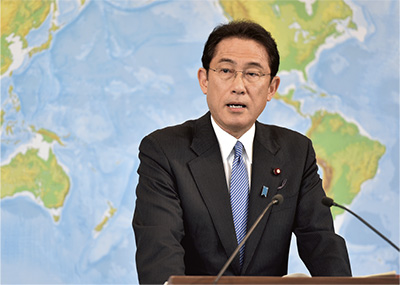 A regular press conference by Foreign Minister (MOFA, Tokyo)
A regular press conference by Foreign Minister (MOFA, Tokyo)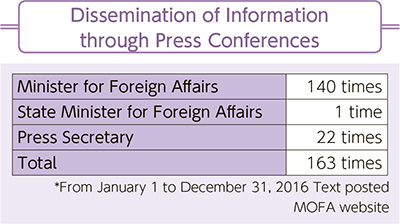
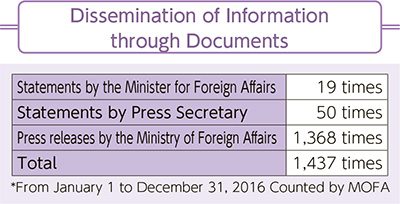
(2) Information Provision through the Internet
MOFA actively works on provision of information through the Internet using websites and social media in order to garner understanding and support for Japan's foreign policy from Japanese nationals and the international community.
MOFA's Japanese website swiftly distributes information about diplomatic activities of the Prime Minister and the Foreign Minister, and provides the latest news on such as Japan's foreign policy and international affairs. Furthermore, MOFA posts a wide range of contents including “Easy Ways to Understand International Situations,” which explains international situations in simple ways, and “MOFA for Kids” for the students of elementary and junior/senior-high schools.
Regarding MOFA's English website as an important tool for public diplomacy, MOFA has enhanced the function of sending messages in English pertaining to Japan's foreign policies, Japan's positions on international affairs and the varied attractiveness of Japan. Information is also available through the websites of Japanese embassies and consulates general overseas in local languages.
With regard to provision of information through social media, MOFA uses Facebook and Twitter, as well as YouTube.
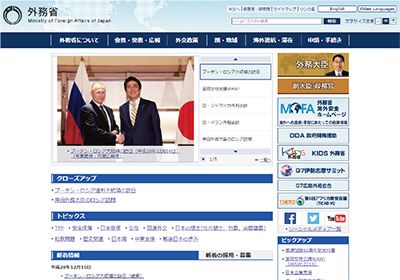 MOFA's website
MOFA's website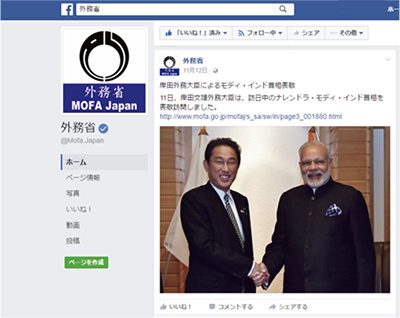 Official Facebook of MOFA
Official Facebook of MOFA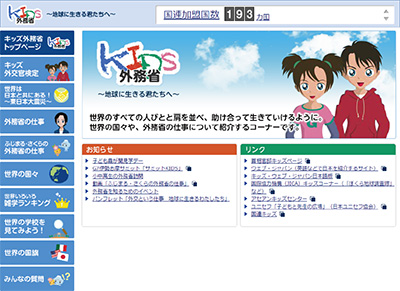 MOFA for Kids
MOFA for Kids(3) Dialogue with Japanese Nationals
MOFA promotes “Public Relations through Dialogue with Japanese Nationals” to provide the people of Japan with an opportunity to directly talk to the Foreign Minister and its officials.
As a part of such opportunities, MOFA holds “Talk to the Minister” to give explanations on Japan's foreign policies and the principles and other themes in which the people have much interest and give candid answers to the questions and opinions of the participants. In November 2016, Foreign Minister Kishida visited Miyagi Prefecture as part of the new initiative “Local to Global” Project and held the symposium “Dialogue with Foreign Minister Fumio Kishida: Delivering a Message to the World about the Attractiveness and the Strong Recovery of Tohoku,” which featured a keynote speech by Foreign Minister Kishida and a panel discussion.
MOFA is committed to using various occasions to promote understanding of foreign policies and international affairs. For instance, MOFA organizes lectures by its officials at international exchange organizations, universities and high schools throughout Japan, through “Lecture on the International Situation,” “Diplomatic Talks,” and “Talks for High School Programs.” It also holds the “International Issue Presentation Contest” for university students and debate sessions between university students and young officials of the ministry through “Dialogue with Students,” as well as providing opportunities for young students to visit MOFA (“Visits by elementary, junior and senior-high school students to MOFA.”).
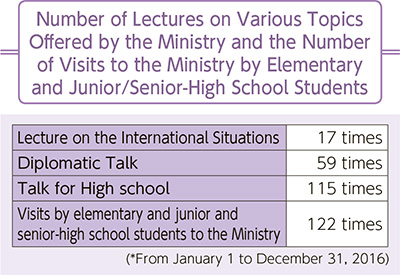
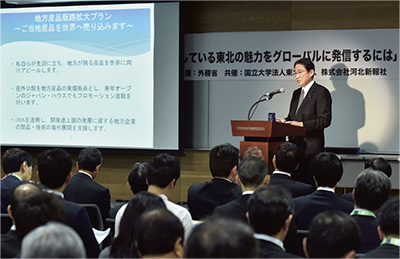 Visit by Foreign Mister Kishida to Miyagi Prefecture under the “Local to Global” Project (November 23, Miyagi Prefecture)
Visit by Foreign Mister Kishida to Miyagi Prefecture under the “Local to Global” Project (November 23, Miyagi Prefecture)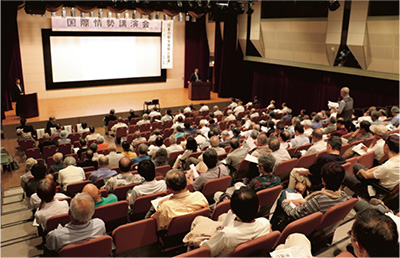 Lecture on the International Situation
Lecture on the International Situation(June 10, Bandai Community Hall, Niigata Prefecture)
Moreover, Japan's ODA policies and specific measures are introduced to the public through various symposia, lectures and “ODA Delivery Lectures” for which officials from MOFA are dispatched to schools, etc. (28 lectures in 2016).
MOFA issues the journal “Diplomacy” with the aim of raising people's interest in diplomacy through active discussions on foreign policies from a wide range of opinion leaders, including scholars, journalists and NGOs. In 2016, it featured the G7 Ise-Shima Summit, the 6th Tokyo International Conference on African Development (TICAD VI), the U.S. presidential election and a variety of other diplomatic events and issues, publishing a large number of papers by famous experts from Japan and abroad, among others.
Moreover, in order to promote further understanding on the organizational structure and foreign policies of MOFA, various pamphlets that explain them in an understandable manner were released. In particular, for the G7 Ise-Shima Summit, public communication aimed at the Japanese people from all walks of life was conducted including the release of pamphlets before and after the meetings, construction of a summit website, and the installment of a public communication booth at the State Guest House, Akasaka Palace. In addition to the above, MOFA surveys public opinion through various forms of media, including the website of MOFA, the website of Prime Minister of Japan and His Cabinet, and the electronic governmental Public Comment Procedure (“e-Gov”), as well as through telephone calls, fax messages and letters. Opinions and comments gathered from the public are shared throughout MOFA and used as a reference in policy making and planning.
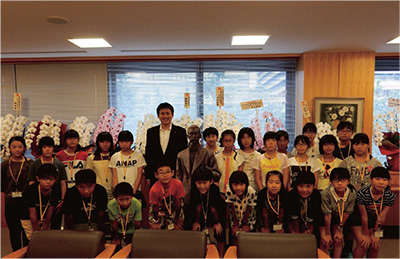 Visits by elementary, junior and senior-high school students to MOFA: Meeting between the members of the Mezase Komura Jutaro Juku (The School for Aspirants to Become the Next Jutaro Komura) organized by the Nichinan City Board of Education, Miyazaki Prefecture, and Parliamentary Vice-Minister for Foreign Affairs Takei (August 23, MOFA, Tokyo)
Visits by elementary, junior and senior-high school students to MOFA: Meeting between the members of the Mezase Komura Jutaro Juku (The School for Aspirants to Become the Next Jutaro Komura) organized by the Nichinan City Board of Education, Miyazaki Prefecture, and Parliamentary Vice-Minister for Foreign Affairs Takei (August 23, MOFA, Tokyo)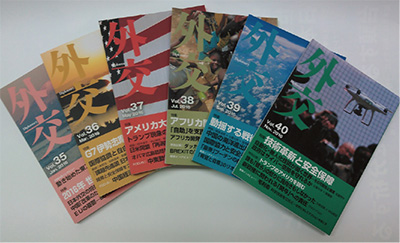 Journal on foreign affairs entitled “Diplomacy”
Journal on foreign affairs entitled “Diplomacy”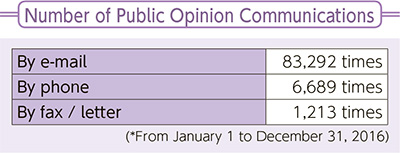
(4) The Promotion of the Declassification of Diplomatic Records and the Information Disclosure
MOFA has voluntarily declassified its diplomatic records at the Diplomatic Archives since 1976. The Rules on the Declassification of Diplomatic Records, which were established in May 2010, stipulates: (1) declassification of diplomatic documents created more than 30 years ago in principle and (2) the establishment of the “Committee for the Promotion of the Declassification of the Diplomatic Records” which is chaired by parliamentary Vice-Minister for Foreign Affairs as well as attended by external experts, to further promote the declassification of diplomatic records and improve its transparency. The number of files which has been transferred to the Diplomatic Archives and made public more since May 2010 reached approximately 28,000 by the end of 2016.
Furthermore, MOFA discloses information pursuant to the Act on Access to Information Held by Administrative Organs while giving considerations to the national security, the relationship of mutual trust with other countries, the impacts on diplomatic negotiations, and the protection of personal information. In 2016, MOFA received 543 requests for disclosure, and the documents totaling 166,794 pages were disclosed.
